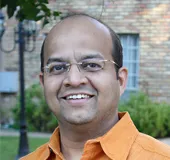-
CENTRES
Progammes & Centres
Location
India, with its cultural heritage rooted in Vasudhaiva Kutumbakam, must use this opportunity to build more effective peacebuilding and peacekeeping programmes

Since its inception, the world has looked to the United Nations (UN) to play a pivotal role in enabling a culture of peace, addressing complex global conflicts, and providing necessary peacekeeping and peacebuilding support.
The unfolding tension in the Middle East between Israel and Iran adds to a long list of examples that showcase the inability of global leaders and institutions to effectively diffuse tensions and prevent such acts, including ongoing wars between Ukraine-Russia, Israel-Hamas and conflicts in Sudan, Myanmar, Yemen, and the Sahel region.
There is an urgent need for new thought leadership that can build a shared vision, and promote peace and harmony
India, an ancient civilisation on the rise, with a global thriving diaspora and a timeless belief in Vasudhaiva Kutumbakam (One Earth, One Family, One Future), must seize this opportunity and offer its thought leadership in designing more effective peacebuilding and peacekeeping programmes.
India has never initiated war. On the contrary, India has played a significant role in UN Peacekeeping Missions contributing more troops than any other country, with over 253,000 personnel serving in 49 of the 72 UN missions since 1948. As of January 2024, around 5,900 Indian troops are deployed across 12 UN peacekeeping missions. The Indian Army soldiers have made significant sacrifices, with over 160 soldiers having lost their lives in the line of duty, showcasing India’s sustained participation and commitment to UN peacekeeping. This credibility provides India with the opportunity to offer its thought leadership in advancing the UN peacekeeping agenda.
The Indian Army soldiers have made significant sacrifices, with over 160 soldiers having lost their lives in the line of duty, showcasing India’s sustained participation and commitment to UN peacekeeping.
In this article, the focus will be on practical ways for India to bolster the objectives of UN peacekeeping and UN peacebuilding missions.
The UN Peacekeeping Operations (PKO) was established with the aim of mitigating conflicts and facilitating the transition to stable societies. Despite noble intentions and dedicated efforts, the effectiveness of these missions often falls short, leaving behind unresolved conflicts and fragile peace. In his seminal review of UN PKO, Maj. Gen. Bardalai shares that most unsuccessful PKOs have been characterised by late deployment, weak mandate, inadequate resources, and ill-equipped and untrained peacekeeping troops.
Specific examples below illustrate the multifaceted nature of violent conflicts where UN peacekeeping missions have struggled to achieve sustainable peace. It can also be argued that the dominant peacekeeping approach may have neglected underlying social and economic grievances. This highlights the need for a new innovative and comprehensive approach to peacekeeping and peacebuilding that would address underlying grievances, the need for healing trauma, promoting inclusive dialogue, and empowering local communities to build peace from within.
| Country/Region | UN Peacekeeping Mission Name | Reason for failure |
| Democratic Republic of the Congo (DRC) | United Nations Organization Stabilization Mission in the Democratic Republic of the Congo | Ongoing armed conflicts, political instability, presence of numerous armed groups. |
| South Sudan | United Nations Mission in South Sudan | Continued ethnic violence and political instability that doesn't allow efforts to protect civilians and facilitate reconciliation. |
| Cyprus | UN Peacekeeping Force in Cyprus | Sporadic tensions and unresolved issues between Turkish Cypriots (Muslim) and Greek Cypriots (Christians) |
| Somalia | United Nations Support Office in Somalia | persistent conflict, terrorism, and governance challenges due to security threats posed by al-Shabaab militants and clan-based violence. |
| Central African Republic | United Nations Multidimensional Integrated Stabilization Mission in the Central African Republic | difficulty in addressing intercommunal violence, political instability, and the proliferation of terrorist groups like Al-Qaeda in the Islamic Maghreb (AQIM). |
Current peacebuilding approaches are largely based on Western models that focus on cultural and structural violence, well-functioning civic institutions, low corruption levels, and equitable resource distribution. However, achieving sustainable peace also requires addressing the psychological and emotional impacts of conflict on individuals and communities. If trauma from violence and conflict is not dealt with, it can lead to frustration and anger, potentially resulting in further violence.
Recognising this, the United Nations Development Programme (UNDP) has begun to advocate for the inclusion of Mental Health and Psychosocial Support (MHPSS) in conflict resolution and peacebuilding efforts. This includes initiatives such as counselling, group therapy, and programmes designed to address individual and collective trauma, regulate emotions, and foster resilience and nonviolent communication skills.
The United Nations Development Programme (UNDP) has begun to advocate for the inclusion of Mental Health and Psychosocial Support (MHPSS) in conflict resolution and peacebuilding efforts.
The emphasis on this ‘inner development’ highlights the need to incorporate India's timeless wisdom of inner peace, through practices like yoga, pranayama, and meditation, to enhance the effectiveness of current peacebuilding strategies. By integrating the Indic approach, we can significantly transform the objectives of UN peacekeeping and peacebuilding missions in two specific ways:
1. Empowering local peacebuilders:
UN peacekeeping missions have faced criticism for their Western-centric approaches, often seen as perpetuating a top-down interventionist paradigm. In contrast, Indic frameworks, focusing on transforming the individual offer a culturally sensitive approach rooted in non-violence and compassion. They prioritise community engagement and recognise the agency of local actors, fostering greater trust and cooperation. Incorporating practices like yoga and meditation into training programmes can address psychological and emotional dimensions of trauma, enhancing resilience and reconciliation efforts. This approach can also facilitate the early exit of UN peacekeepers thus saving costs and empowering non-traditional actors such as doctors, nurses, and teachers to lead peacebuilding initiatives, accelerating the process and ensuring sustainability. The work done with The United Nations Peacekeeping Force in Cyprus exemplifies the effectiveness of this approach to empower local peacebuilders.
2. Enhancing resilience and capacity of UN peacekeeping forces:
Peacekeeping in conflict zones is demanding and can strain peacekeepers' mental resilience. Indic practices like yoga and meditation offer proven tools to address associated traumas. By incorporating these proven practices into peacekeeping training programmes, soldiers can cultivate greater resilience, empathy, and calm amidst challenging situations—qualities essential for navigating the complexities of conflict zones. These practices will also enable UN peacekeepers to develop greater empathy and understanding, essential qualities for building trust and fostering reconciliation within communities torn apart by violence. By integrating this Indian wisdom into peacekeeping training programmes, soldiers can be equipped with the insights and tools needed to engage authentically with local communities, fostering healing, reconciliation, and social cohesion. Such training can thus create a fundamental shift in transforming UN peacekeepers—from mere enforcers of security to empowered agents of peacebuilding. This unique capacity-building approach has been demonstrated with law enforcement agencies like the Los Angeles Police Dept.
By integrating this Indian wisdom into peacekeeping training programmes, soldiers can be equipped with the insights and tools needed to engage authentically with local communities, fostering healing, reconciliation, and social cohesion.
India has become a valued partner in many strategic endeavours like the India-Middle East-Europe Economic Corridor, QUAD, as well as the I2U2 partnership to tackle global challenges and advance economic opportunities in recent times. The Indian diaspora is thriving all over the world. Indian conglomerates are doing business across the world and also in sensitive conflict zones.
Peace and prosperity are interdependent. Violence, conflicts, and instability will directly affect the Indian diaspora as well as India’s business and geopolitical interests.
Therefore, India, with its cultural heritage rooted in Vasudhaiva Kutumbakam, must lead in fostering greater peace and stability globally. By advocating for Indic frameworks and practices in UN peacekeeping and UN peacebuilding operations, India can meaningfully contribute to enabling a future defined by peace, and harmonious coexistence. This can also help realise India’s aspirational vision of becoming a Vishwa Guru.
With the world order in chaos, the time for action is now.
Mandar Apte currently manages the Cities4Peace initiative. Prior to this, Mandar was a visiting scholar at George Mason University School for Conflict Analysis & Resolution
The views expressed above belong to the author(s). ORF research and analyses now available on Telegram! Click here to access our curated content — blogs, longforms and interviews.

Mandar Apte currently manages the Cities4Peace initiative. Prior to this Mandar was a visiting scholar at George Mason University School for Conflict Analysis &: Resolution ...
Read More +
